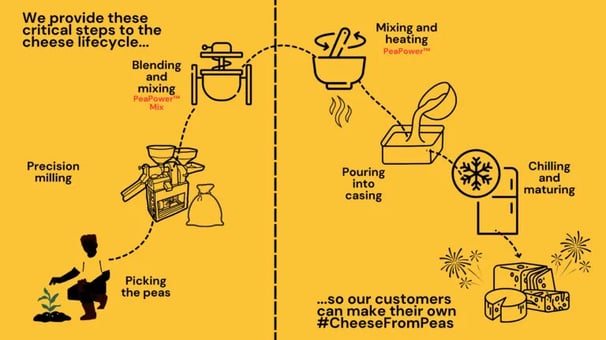Vegan Cheese with Legume based Ingredients by UK-based Startup
SUSTAINABILITYALTERNATIVE PROTEINSDAIRY & ALTERNATIVES


Image source: Good Pulse foods
As the demand for plant-based foods continues to rise, vegan cheese has emerged as a popular alternative to traditional dairy cheese. However, many vegan cheeses on the market today fall short in terms of taste, texture, and functionality, particularly when it comes to melting and stretching. Addressing these challenges, Good Pulse Foods, a Nottingham-based startup, has developed a method for producing vegan cheese analogues (VCAs) using legume-derived ingredients. This patented innovation promises to deliver vegan cheeses that closely mimic the taste, texture, and functionality of their dairy counterparts, while also being more sustainable and cost-effective.
The Challenge of Vegan Cheese
Traditional vegan cheeses often rely on nuts, starches, or isolated plant proteins, which can result in products that lack the desirable properties of dairy cheese. Common issues include:
1. Poor Melting and Stretching: Many vegan cheeses fail to melt or stretch like dairy cheese, making them unsuitable for applications like pizza or grilled sandwiches.
2. High Costs: Vegan cheeses made from nuts or highly processed ingredients can be expensive, with some products costing upwards of $12 for a small block.
3. Low Nutritional Value: Many vegan cheeses contain little to no protein, relying instead on fats and starches, which can make them less nutritious than dairy cheese.
4. Sustainability Concerns: The production of isolated plant proteins often generates significant waste, raising environmental concerns.
Good Pulse Foods’ invention addresses these challenges by leveraging legume-derived ingredients, such as peas, lupin, chickpeas, and lentils, to create vegan cheeses that are not only more functional but also more sustainable and affordable.
The Good Pulse Foods Solution: Legume-Based Vegan Cheese
The core of Good Pulse Foods’ innovation lies in the use of legume-derived ingredients to produce vegan cheese analogues (VCAs). These ingredients are derived from legumes such as yellow peas, chickpeas, and lentils, which are rich in protein, fiber, and starch. The method involves several key steps:
1. Ingredient Preparation: Legume seeds are processed using methods such as milling, pressing, and protein extraction to create ingredients like pea flour, pea protein concentrate (PPC), and pea protein isolate (PPI). Legume seeds can be pre-treated through soaking, boiling, roasting, or steaming to enhance their functional properties.
2. Formulation: The VCAs are formulated using a combination of legume-derived ingredients, such as pea flour or pea protein concentrate, along with other plant-based ingredients like starches, fibers, gums, and lipids. Monoglycerides (MG) are added to improve melting characteristics, while gelling agents like carrageenan can be used to enhance texture and firmness.
3. Manufacturing: The ingredients are mixed, hydrated, and heated to create a viscous paste, which is then processed using kitchen-scale equipment (e.g., a Thermomix) or industrial-scale machinery. The mixture is poured into molds, cooled, and stored at refrigeration temperatures to set.
Key Advantages of Good Pulse Foods’ Method
1. Improved Functionality: The VCAs produced using this method exhibit desirable properties such as meltability, stretchability, and firmness, making them suitable for a wide range of culinary applications.
2. Cost-Effective Production: By using less refined ingredients like pea flour and pea protein concentrate, the method reduces production costs and minimizes waste compared to highly processed alternatives.
3. High Nutritional Value: The legume-derived ingredients provide a rich source of plant-based protein, fiber, and other nutrients, making the VCAs more nutritious than many existing vegan cheeses.
4. Sustainability: The use of legumes, which are environmentally friendly and require less water and land than dairy farming, aligns with the growing demand for sustainable food production.
5. Versatility: The method can be adapted to produce a wide range of vegan cheese types, including soft, spreadable cheeses and hard, sliceable cheeses, as well as cheeses with added flavors or inclusions like herbs and spices.
Applications of Legume-Based Vegan Cheese
The VCAs produced using Good Pulse Foods’ method have numerous applications:
1. Pizza and Pasta: The improved meltability and stretchability make these cheeses ideal for use on pizzas, lasagnas, and other baked dishes.
2. Sandwiches and Burgers: The firmness and slicing ability of the cheeses make them suitable for use in sandwiches, burgers, and wraps.
3. Snacks and Appetizers: The cheeses can be used in snack foods like cheese sticks, crackers, and dips.
4. Gourmet Cooking: The ability to customize flavors and textures makes these cheeses suitable for gourmet applications, such as cheese boards and artisanal recipes.
By addressing the functional, nutritional, and sustainability challenges of traditional vegan cheeses, this invention has the potential to revolutionize the market and meet the growing demand for high-quality, sustainable, and affordable plant-based foods.
